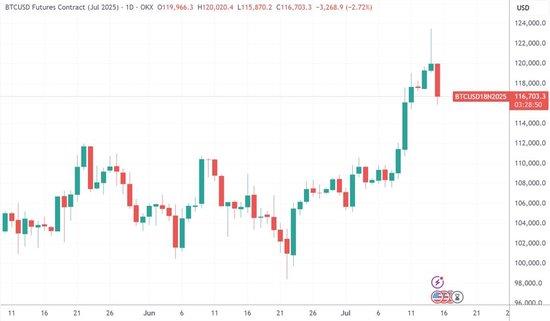
Cailian Press, July 16th (Editor: Shi Zhengcheng) – In a procedural vote held on Tuesday, the Republican conservatives in the United States House of Representatives successfully obstructed three cryptocurrencies legislation processes, including the stablecoin bill, causing constituent stocks to fluctuate and decline.
Affected by this news, Robinhood and Coinbase saw their shares fall on Tuesday, with Circle Internet, the world’s second-largest stablecoin issuer, dropping over 4%. Bitcoin, which had reached a historic high on Monday, also fell more than $3,000 due to this news.
(Bitcoin daily chart, source: TradingView)
The procedural vote held in the afternoon of local time on Tuesday concluded with 196 votes in favor and 223 against, with 13 Republican members voting against. From their statements, apart from disagreements on policy, they also expressed dissatisfaction towards their Senate colleagues.
Georgia Republican Congressman Marjorie Taylor Greene told the media that she voted against the stablecoin bill because she wanted to bundle it with two other bills (one market structure bill and one bill prohibiting the Federal Reserve from issuing digital currencies), but the leadership of the House did not agree to vote on this amendment.
Green emphasized, “The stablecoin bill does not reflect President Trump’s executive order on January 23rd, which explicitly states that central bank digital currencies should be banned.”
The chairman of the “Free Core Group” in the House of Representatives, Maryland Republican Congressman Andy Harris, stated that his group believes in completely eliminating CBDC, but actions under existing rules cannot achieve this.
Ohio Republican Congressman Warren Davidson, while voting for the procedural rule, stressed his opposition to the stablecoin bill. Davidson said, “The House has grown accustomed to getting absolutely no respect when we send something to the Senate. I want to see what we can do next. We hope to devise a plan that truly focuses ‘Crypto Week’ on cryptocurrency.”
It should be noted that the Federal Reserve does not intend to issue CBDC, and Powell has repeatedly emphasized that issuing CBDC requires explicit congressional authorization. If these three bills are combined, it may cause another part of the Republican caucus to switch sides. Moreover, even if the House passes a “three-in-one” cryptocurrency bill, the Senate would need to reconsider it, which could lead to significant delays.
The latest market news suggests that the House might attempt another vote later on Tuesday. If passed, the debate on cryptocurrency legislation could immediately begin, followed by a final vote later this week.